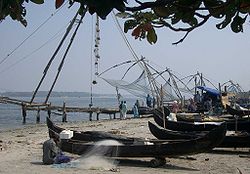Cochin: Difference between revisions
| Line 33: | Line 33: | ||
*[http://www.thehindu.com/life-and-style/society/step-into-history/article4222045.ece "Step into history"]: Jew Street, Mattancherry, Cochin by Priyadershini S. December 20, 2012 ''The Hindu''. Also see the page [[Jewish]] | *[http://www.thehindu.com/life-and-style/society/step-into-history/article4222045.ece "Step into history"]: Jew Street, Mattancherry, Cochin by Priyadershini S. December 20, 2012 ''The Hindu''. Also see the page [[Jewish]] | ||
*[http://keralastatearchives.org/main1.htm Archives Department Government of Kerala] Records of the Cochin State (AD 1567-1949) are available at the Regional Archives, Ernakulam | *[http://keralastatearchives.org/main1.htm Archives Department Government of Kerala] Records of the Cochin State (AD 1567-1949) are available at the Regional Archives, Ernakulam | ||
*[http://www.thehindu.com/features/metroplus/travel/they-landed-here/article4465585.ece "They landed here…"] by Arun Bhatia ''The Hindu'' March 1, 2013. Mentions the small port called Cranganore by the British, 35km from Cochin | |||
====Historical books online==== | ====Historical books online==== | ||
*[http://books.google.com.au/books?id=H044AAAAMAAJ&pg=PP7 ''British and Native Cochin''] by Charles Allen Lawson 2nd edition 1861 Google Books. First published 1860 | *[http://books.google.com.au/books?id=H044AAAAMAAJ&pg=PP7 ''British and Native Cochin''] by Charles Allen Lawson 2nd edition 1861 Google Books. First published 1860 | ||
Revision as of 00:43, 5 March 2013
| Cochin | |
|---|---|

| |
| Presidency: Madras | |
| Coordinates: | 9.9509843°N 76.251649°E |
| Altitude: | |
| Present Day Details | |
| Place Name: | Kochi |
| State/Province: | Kerala |
| Country: | India |
| Transport links | |
| FibiWiki Maps | |
|---|---|
| See our interactive map of this location showing places of interest during the British period | |
| Cochin |
Cochin (now called Kochi) is a city in the modern state of Kerala. In the British era it was part of the Madras (Presidency). Kochi City comprises three municipalities in the Cochin area: Fort Cochin, Mattancherry and Ernakulam. Ernakulam is the largest urban area.
History
Cochin became the site of the earliest European settlement in India when the Portuguese landed in 1500. The Kingdom of Cochin (see Cochin State) agreed friendly relations with the Portuguese, who cemented their involvement in the city by winning a war with the rulers of Calicut. Although the Raja of Cochin was nominally in charge, the Portuguese effectively ruled the city from 1503-1663. The Dutch then conquered Cochin and ruled the territory until 1773 when Hyder Ali took possession. In 1814, the British acquired Cochin under the Anglo-Dutch Treaty in exchange for the island of Banca (in Indonesia).
Fort Cochin area
Built around the old Portuguese Fort Emmanuel, this area is the oldest part of Cochin, with Portuguese, Dutch and British buildings.
Churches
External links
- Wikipedia:
- British capture of Fort Cochin Google Books
- This India List post about mixed marriages mentions Cochin
- "Lost rulers of the Malabar Coast" by N P Chekkutty 10 December 2012 himalmag.com. "Tales of love and loss from the heyday of Portuguese rule in Kochi".
- "Step into history": Jew Street, Mattancherry, Cochin by Priyadershini S. December 20, 2012 The Hindu. Also see the page Jewish
- Archives Department Government of Kerala Records of the Cochin State (AD 1567-1949) are available at the Regional Archives, Ernakulam
- "They landed here…" by Arun Bhatia The Hindu March 1, 2013. Mentions the small port called Cranganore by the British, 35km from Cochin
Historical books online
- British and Native Cochin by Charles Allen Lawson 2nd edition 1861 Google Books. First published 1860
- The land of the Permauls: or Cochin, its past and its present by Francis Day 1863 Google Books
- "Kingdom of Cochin" page 156 A description of the coasts of East Africa and Malabar in the beginning of the sixteenth century by Duarte Barbosa, a Portuguese. Translated from an early Spanish manuscript in the Barcelona library with notes and a preface by Henry E. J. Stanley. 1866 Archive.org